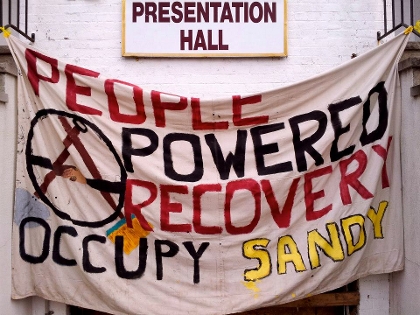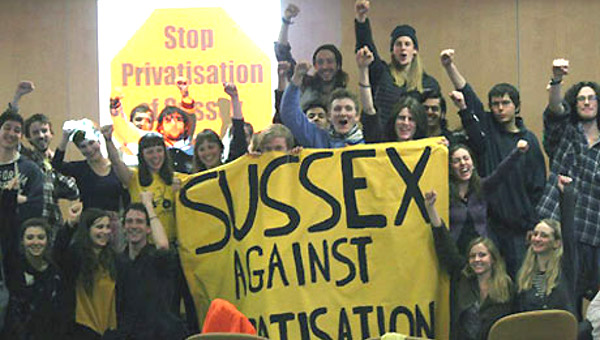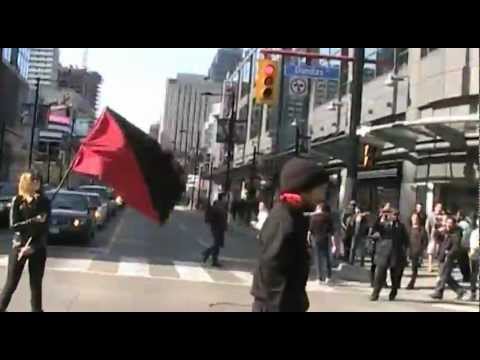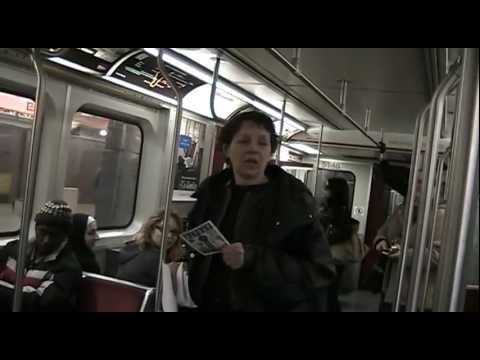From Protest to Disruption
Frances Fox Piven has spent decades writing about and participating in social movements in the United States. She was gracious enough to sit down for an interview with Chris Maisano, a writer and activist in the New York local of Democratic Socialists of America, where this interview first appeared. They discuss the Occupy Wall Street protests, the complex interplay between social movements and electoral politics, and the future of the occupation movement.
Chris Maisano [CM]: What have you thought of the Occupy Wall Street protests so far?
Frances Fox Piven [FFP]: I think they’ve been pretty terrific. And I really am hopeful that it’s the beginning of a new period of social protest in this country. I think a lot about the protest is absolutely on target, it’s so smart. It was so smart to pick Wall Street because Wall Street looms so large not only in the reality of inequality and recession policy, but it looms so large in the minds of people now because everybody knows that they’re stealing the country blind. So they picked the right place, they had somehow – I don’t know how self-consciously, maybe self-consciously – absorbed a kind of lesson from Tahrir Square of staying there, because usually we have demonstrations and marches and parades and things, and they’re over in a nanosecond. And all that the authorities have to do is wait, because they’re gonna be over.
So what they tried to do is take this classical form of the mass rally – they didn’t do it alone, obviously it happened in Egypt too – and connected it with the disruptive potential of mass action because they said ‘we’re staying.’ And ‘we’re staying’ is more troublesome. Not only that, ‘we’re staying’ makes it possible for them to organize and mobilize throughout the course of the action, which is what they do. So that part of it was pretty, pretty smart.
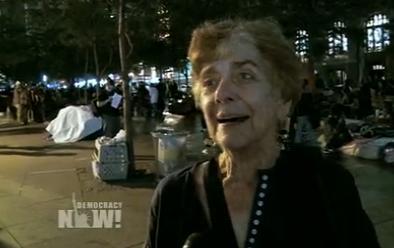
They are smart in being very inclusive. I mean, they’re very happy to include everybody, and they’ve actively reached out to the unions. When has a youthful protest done that in living memory? A very long time since that’s happened. But they knew from the beginning – probably they were helped to learn that from Wisconsin. And they’re so happily counter-cultural, you can’t even get angry at them if you’re a stiff old person! Then you read their statements, I’m sure you do. Well, I do too. And I think they’re very thoughtful for statements issued by a general assembly sitting on the cold cement – they’re very good statements, and they really are statements that include the 99%. So it’s great.
It’s also true that when I say I think we may be on the cusp, at the beginning of another period of social protest and [Occupy Wall Street] is the sign, I don’t think that social protest works as a little explosion and gets bigger and bigger and bigger and bigger. It doesn’t happen that way. It’s much more interrupted, dispersed, there are periods of discouragement – 1959-1960 the civil rights movement people thought it was over, after 1962 in Albany, Georgia – this movement is going to be like that too.
CM: Why do you think it’s starting now, rather than say, three years ago when the crisis broke out? What do you think is behind the timing of the protests?
FFP: Well, I think a lot happened in the last three years that were quite shocking. Like the failure of corporations to invest any of the money they are sitting on so that the jobless rate continued to increase. Like the refusal of Republicans who are obviously the political allies of these people, the refusal of the Republicans to support a serious jobs program. And you know, the banks took a lot of taxpayer money and what did they give back for it? They gave themselves the money in executive bonuses. Everybody – well, not everybody – but a lot of people know that now, and certainly these young people know that.
So I think that’s part of it, but you know things don’t happen on a dime anyway. 1929 was not the year of big protests in the 1930s. If there was a big year, it was 1935, 1936, 1937.
CM: Do you think disillusionment with the Obama administration is playing a role too?
FFP: Yeah, probably. I think that’s right.
CM: We’ve already talked about this a little bit, but many people, including a number of people on the left, have criticized the protests for lacking a formal organizational structure or leadership, or an articulated set of demands. A lot of people have been saying ‘what do you want?’ What do you make of that criticism?
FFP: I think it’s so misplaced. It’s so irritating, it’s so – I can’t stand it! I’ve been listening to it for like 10 days, 15 days. The contempt, especially the mainstream media people. I wish they would just stuff their feet in their mouths.
In the first place, it’s not true, and they’re not listening. It’s like they’re so eager to spout off this line of criticism because the protesters’ shirt-tails are not tucked in or something like that. In fact, I think the intelligence that has gone into this protest is very impressive. And the list of articulated demands that came out yesterday – it’s not only intelligent, it’s artful because it takes into account the grievances of such a wide range of constituencies and shows that they fit together pretty well. So that puts the lie to that criticism.
As for ‘they’re not organized,’ they’re not organized the way you think people should be organized. But if you mean by organization coherence and coordination, it works fine. The general assembly meets every day, the human mic is really a pleasure.
CM: It can take a while, though.
FFP: [laughter] But it works! And it’s so much fun to speak to the human mic, because when else do you hear your statement echoed across a square? So I totally disagree with that. And I think they [left critics of the protests] better get their heads on straight because they should be supporting this movement – it may be their only chance.
CM: These protests have clearly struck a chord. We’ve got Occupy Philly going on, Occupy LA, Occupy Boise – they’re all over the place. Why do you think these protests have struck a chord and spread when earlier protests, such as last October’s One Nation Working Together rally in Washington, did not?
FFP: Well this didn’t at the beginning either.
CM: Then what helped it to grow? Was it the police repression?
FFP: I don’t think it was the police repression, because obviously there’s been police repression before. I do think that their language and demands and the site of their protest was very sensitively chosen. They were sensitive to what Americans think is going on in the country, but it didn’t work right away. They couldn’t break through and get into the mass media right away, which is certainly part of the reason.
I think you’ve asked a question that we don’t really know the answer to. Which is why I always say to frustrated, anxious activists, “let’s try, let’s see whether it works, whether it resonates.” You have to keep trying. And a lot of movement work in the early stages is like that. When the Communists started organizing Unemployed Councils in the 1930s, it was after a series of failures at organizing – they didn’t always call them Unemployed Councils, bread councils or whatever it was – on and off since 1921.
CM: As yesterday’s march and recent comments by even the president and vice-president have showed, a lot of the more institutionalized forces on the left like the unions and MoveOn and the Van Jones American Dream Movement are trying to latch on to the protests and turn them into what some people have called a liberal version of the Tea Party. How do you think their involvement will effect the movement? How should the activists at the core of the movement relate to them?
FFP: They should be friendly. They should ask them to do things, they should give them assignments. And not adopt the insignia of these groups as their own. In other words they should maintain considerable autonomy, but nevertheless they should treat these groups as allies, as they treated the unions as allies. But they shouldn’t ever let unions tell them what to do, they shouldn’t let Van Jones tell them what to do. Partly because they seem to know better, really. So I don’t think that’s their biggest problem, how to deal with their erstwhile supporters.
CM: What do you think their biggest problem is?
FFP: Spreading the movement. Thinking of second, third, fourth, fifth phases. Other forms of disruptive protest that are punchier than occupying a square.
CM: In a lot of your writings you say that power that people have comes out of their institutional location, and refusing whatever role they’re supposed to play within that institution. I’ve been trying to use that framework to think about what the possibilities for disruption for these protests are, but it’s been difficult because we’re not talking about workers working in a specific workplace, or students in a specific school, where if they all say ‘we’re not going,’ the thing shuts down. What is it about the protests that will allow the people encamped in the park to exercise their capacity for engaging in disruption?
FFP: I think what’s happening now is brilliant theater. This is not a criticism, but it’s going to be a really tough movement, it’s not going to win anything easily.
CM: Especially since it’s being policed so heavily.
FFP: Not only that, who is it going to win it from? The American ruling class is so fragmented and cannibalistic, and it doesn’t even care what’s going to happen – the future for them is about two years. It has no interest in responding to the demands about pollution, for example, or safe food supplies. So it’s a tough movement, it has to hang on. Its most likely constituencies are students and workers. It’s not immediately clear to me which workers. I think that’s a little puzzling to me. But at John Jay yesterday and other schools at CUNY walked out, and they went down to Foley Square. I was there this afternoon, they had a meeting on campus, and those students are just wildly enthusiastic about this thing. They’re good, those students.
CM: It seemed to me, just observing from afar, that once the mass protests in Wisconsin shifted gears and put most of its focus on electoral politics and recall campaigns they lost their power and the degree of popular support they had. With an election season coming up, I’m sure there are going to be pressures within the movement and without to channel it toward the electoral system. How do you think the movement should engage with that system, if at all? Should it ignore it, or be involved in a limited way? I just think that this question has the potential to cause divisions within the movement and create conflict.
FFP: Yeah, there will be people who will say ‘we have to go out and do real politics now and work for Obama.’ And Obama, of course, when the general election approaches will appear as more of a left-liberal than he actually has been since he took office, and people will forever be deluded by that.
I think we have to be very careful about that because electoral politics are important. I’ve never accepted the dichotomy of electoral vs. movement politics. I’ve never thought that movement politics detracts from electoral politics excepting in the most obvious sense of using the time that you could be doing door knocking that you could be doing for the movement. But there’s no inherent sapping of energy for one because of the other. So I think what the stance of lefties like you and me should be is that some people really should do electoral politics because they’re so well positioned to do it and do it effectively and because the 2012 election is important. They’re not lying. But the movement is also electoral politics. It’s a movement first and foremost but it has an impact on people’s opinions, on the way people see the world, and the way they act at the ballot box. And the movement helps people to see what the issues are in a much bolder way than Barack Obama will, for example. So it’s just a little more complicated as what most people say when the election approaches but that’s what we should say.
CM: In a lot of your works you talk about how the extent of what a movement can win is structured, to a significant extent by the balance of forces within the electoral-representative system, and what the potentialities for creating electoral dissensus are, for creating fissures within a dominant electoral coalition that may have to respond to the demands of a movement. Do you think that the balance of forces right now is favorable to a movement like this in terms of winning some of the demands that are raised?
FFP: Listen, if this movement really develops it could put the votes of young people, minorities – or at least young minorities – a lot of poor people, it could put those votes at risk for the Obama administration.
CM: How so?
FFP: I think to some extent they’re at risk right now because [2008] was a high turnout election among a volatile constituency. The high turnout came from youth, minorities, and the poor. Whether they’ll turn out again is a big question. But to the extent that the movement seizes the imagination of these groups, the Democrats will have to bargain harder for their votes. That’s what movements can do.
CM: Now that the movement has acquired a measure of legitimacy and popular support, what are the next steps? If you had to advise the activists who are driving this thing, what would you tell them to do?
FFP: I would tell them that they’ve got to continue their outreach work, and the outreach work has to include helping the creation of new occupations. It’s not the case that the occupation at Wall Street has to continue through the winter. That could be hard to pull off. But we’ll have other occupations, rolling occupations of public space. They have to continue their work with students and with the unions, and also look for the opportunity for new kinds of occupations – sit-ins, basically. The sit-in is, as you know, a brilliant tactic. It’s never been surpassed. Where else can we make our mark on the physical plant that they have constructed on the earth? Actually, we did the construction. •


